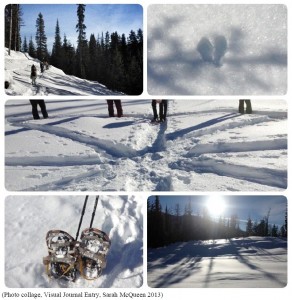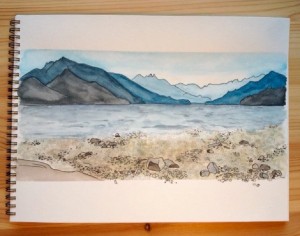Place Conscious Learning and Student-Led Inquiry
I have experienced rural education from both a student’s perspective and a teacher candidate’s perspective. As a UBC West Kootenay Teacher Education Program student, I have had the opportunity to observe rural teaching in BC classrooms from Edgewood, to Crawford Bay. Each visit was met with welcoming and eager teachers and genuinely enthusiastic students. Without exception, it appeared that each student truly wanted to learn and be at school. Stunned by the overwhelming student enthusiasm, I began to search for reasons that could help me better understand how the teachers in small, rural schools were able to successfully foster enthusiasm for learning and school in each of their students. Although, each classroom I visited involved different teaching strategies, I noticed common threads between each classroom. These threads included adventurous teachers who truly love what they do and who are willing to take risks, and serve as compassionate guides. As such, they facilitate students’ learning through place-conscious learning and student-led inquiry projects.
My observation in Terry Taylor and Gary Parkstrom’s Grade 10 to 12 English and History 12 classes at Lucerne Elementary-Secondary School, located in New Denver, BC, provided me with a glimpse into how to foster student enthusiasm for learning and school. It is my belief that rural schools provide teachers with a greater opportunity to get to know each student both inside and outside of the classroom. Having spent time to get to know their students, Terry and Gary identified their students’ keen interest in filmmaking and passion for making a difference. With this information in mind, this team of teachers set out to develop a cross-curricular project centered on the theme “a place of peace and belonging.” Using this central theme, students developed an inquiry, connecting their investigations as to what makes the world a better place. More specifically the students looked at what makes New Denver and the Slocan Valley special for so many different groups of people. With the help of grant money, Terry, Gary and their students were able to collaborate with Vancouver-based documentary film makers Moira Simpson and Lisa Nielsen to develop short documentary films to answer their inquiry focuses and demonstrate their learning.
To successfully complete the project, students ventured into their community and connected with several community members who could help them answer their inquiries. The enthusiasm students showed for this project was evident because they arrived well before the start of the school day, worked through their breaks, and continued their work after school without complaint. Furthermore, when I spoke with students about their films, it was obvious they were passionate and knowledgeable about the subject matter and project process. Once the films were complete, the school opened its doors for a public film viewing. This viewing furthered the learning process of each student because they had the opportunity to share their learning with the community, express their gratitude towards the community members who assisted them with their projects, and further advance the already healthy relationship between the school and the community.
Although this film project only illustrates one way in which teachers can use their passion for teaching, willingness to take risks, and ability to serve as compassionate guides who facilitate student learning through place-conscious learning and student-led inquiry projects, it is now apparent to me how important each of these components are in fostering enthusiasm for learning and school in each student. These components also allow teachers to better connect the curriculum to student’s interests, and improve students’ ownership over their education by matching their teaching practices to student interests.
It is my hope, as a future teacher, that I too will be able to share my enthusiasm for learning by integrating place-conscious learning and student-led inquiry projects into my teaching practice, so that I can foster enthusiasm for learning and school in each of my students.
Melissa Dalgaard, WKTEP Teacher Candidate, 2012-13


